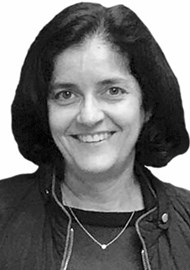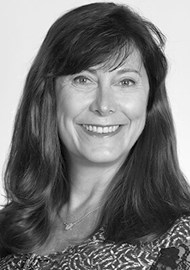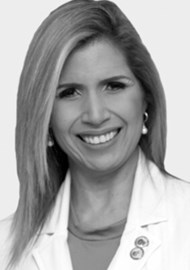Norma de Oliveira Penido, Priscila Bogar from Brazil and Sajidxa Mariño from Venezuela, leaders in otolaryngology, discuss their career journeys, the advantages and disadvantages they exerienced along the way, and the current state of ENT practice for women in South America.
Three women otolaryngology leaders from South America were interviewed. Dr Penido is Professor and Coordinator of the Postgraduate Program in Medicine (Otorhinolaryngology) at the Department of Otorhinolaryngology and Head and Neck Surgery at Universidade Federal de São Paulo/Escola Paulista de Medicina (UNIFESP/EPM). Dr Bogar has been a professor of otorhinolaryngology at the Faculdade de Medicina do ABC, for 18 years, since the age of 36. Dr Mariño is Past President of the Venezuelan Society of Otolaryngology and served in that position from 2015 to 2018.
What can you identify as barriers that you’ve overcome to reach your career goals and your leadership goals?
NP: In my training and as a junior physician, I did not notice any barriers regarding my gender. However, years later I applied for a professor position at a surgery department at a federal university in Brazil but, even with having all the credentials and the approval, my entry was denied. I had to institute a lawsuit against the university to be able to claim my position. I won in court but it took six years. Later, I was elected Coordinator of the Post-Graduation Program of the Department of Otorhinolaryngology of my institution and I am now greatly respected and don’t see any more barriers in this position.
PB: Female surgeons suffer very great prejudice, particularly by other specialties like neurosurgery. The only way to overcome this is to show your expertise in the field during your surgery. Once a neurosurgeon said to me that “to operate well, I have to use testosterone.”
SM: Mainly the difficulty is for others to accept new concepts in medicine, to break the stereotypes from the time of being a student, beginning by being a woman and wanting to develop a surgical specialty, postponing having children until completing studies and then with greater age and responsibility, coordinating how to take care of the children while moving forward with medical projects. Add to this the constant fight to have a different way of working, achieving over the years credibility and respect for how I do things. Through all of this, I have the responsibility of the care of my children and keeping the family together.
What can you identify as advantages you’ve experienced to reach those same goals?
NP: Unfortunately, to reach the same goals as a man you have to be more competent than them and you cannot quit despite the disadvantages. You have to keep on going and keep on trying. The key is to better yourself everyday and aim higher each time.
PB: Women are more organised and calm in working relationships with their peers and bosses; they try to solve their problems in a more controlled way.
SM: In Venezuela, otolaryngology has been very well-represented by women. Having been preceded by them has been a strength, and the recognition of the years of work has given its rewards.
Do you feel women in ENT need mentorship/sponsorship, or have the doors been opened already?
NP: Mentorship and sponsorship can lead to an easier leadership carrier path for women, so I believe they are still necessary because the doors to women haven’t all been open in the same ways when compared to men, especially when it comes to leadership roles.
PB: In Brazil I see that the doors are already open, more and more women are in a position of command.
SM: Women in otorhinolaryngology, I believe, in Latin America have opened doors for the women of today; however, having to manage family and profession always brings more stress to a woman than to a man and we need some guidance along the way.
“To reach the same goals as a man you have to be more competent than them and you cannot quit despite the disadvantages”
What are the main pieces of advice you’d give to younger women?
a. Work, hard.
b. Never give up and do it again if needed.
c. Be humane and respect all the others in your life.
d. The most important thing is to balance professional, family and personal lives; one should never disrupt the other.
e. Always read and learn.
f. Be polite, kind and sincere to all people.
g. Focus on how you want to live as an integral, personal and professional person.
h. Know how to differentiate the stages where a personal or professional decision should weigh more, to maintain balance.
i. Believe in yourself.
If you think the playing field is not level for women, how do we get there?
NP: We will only reach equality when gender is not the main aspect in a selection process, but the quality and competence of the person applying for the position is.
PB: We’re already in the game!
SM: In Latin America the playing field is well-suited to women. For us in Venezuela, because we are mostly women, this has allowed us to achieve leadership positions without barriers.
What makes you happy about being an otolaryngologist?
All three leaders expressed the joy in being a physician, both a surgeon and a clinician, having the ability to treat patients of all ages, and being able to explain the disease process and engage in dialogue with their patients. Otolaryngology provides the freedom to combine the different roles of work and home life.
What makes you happy about being a leader?
NP: As a leader, I can apply and influence people into doing what I believe is right, I can change the course of what I think needs to be changed. More than that, I can mentor the next generation into being better physicians and otolaryngologists.
PB: I am a person who is very close to my team: my residents call me Pri. My leadership approach is by competence and not by imposition. I try to listen and respect the opinions of all. Our team has 50 otorhinolaryngologists; open dialogue is the main differential in our service.
SM: I am glad to be a leader to be an example of what can be achieved with confidence, perseverance, work and organisation.
What do you wish you had done better – or not done at all?
NP: I don’t think I could have done anything different, because I believe in doing what I think is best for the current situation and doing it the best way possible, and when something didn’t end the way it was supposed to in the first instance, I never got scared to study more or to try again.
PB: To this day, I have no regrets. SM: What I hope I have done better is to have shown that I work with passion, innovation and confidence, and that I have become an example in my profession without neglecting my children. What I do not think I have done very well is leaving enough time for me as an individual being. I hope I can work on that in the years to come.







